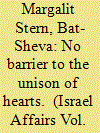| Srl | Item |
| 1 |
ID:
180062


|
|
|
|
|
| Summary/Abstract |
In the first elections for the Israeli parliament (January 1949) WIZO ran as a women's party seeking equal rights for women. It won enough votes for a parliamentary seat – highly unusual in that day and age. WIZO was unique in that it started out as an apolitical women's organisation aligned with the mid-stream Zionist consensus and redefined itself as a party fighting for gender equality.This article examines the developments in the General Zionist Party that led WIZO, founded as a women's philanthropic organisation, to run as an independent political party on its own platform on the eve of the establishment of the State of Israel. It will also look at the impact of WIZO party on Israel's center-right - the General Zionists, the Progressive party and Herut - in the context of the Constituent Assembly elections. The establishment of a women's party in 1948-49 was a unique phenomenon with no equal anywhere in the world at the time.
|
|
|
|
|
|
|
|
|
|
|
|
|
|
|
|
| 2 |
ID:
160298


|
|
|
|
|
| Summary/Abstract |
A coalition of women from all walks of life was common in women’s activism at the beginning of the twentieth century. The recognition of the importance of the empowerment of women through autonomous, public activity was also shared among the women’s organisations that decided to cooperate in the political arena in Eretz Israel. Their collaboration indicates the importance they attached to the commitment to united action that was based on the acceptance of Zionist principles, on the one hand, and their aspiration to overcome what separated them, on the other. The women’s coalition overcame geographical distance and differences in class or political and social orientation, while challenging the old consensus and the boundaries of exclusion and inclusion prevailing in Zionist society. This article focuses on the collaboration between women’s organisations of labour Zionism and middle-class Zionism of various national affiliations, thus forming a transnational coalition in the build-up to statehood. Their claims, activities and modes of operation in the fields of politics and economics are analysed alongside the results and the effect of their efforts.
|
|
|
|
|
|
|
|
|
|
|
|
|
|
|
|